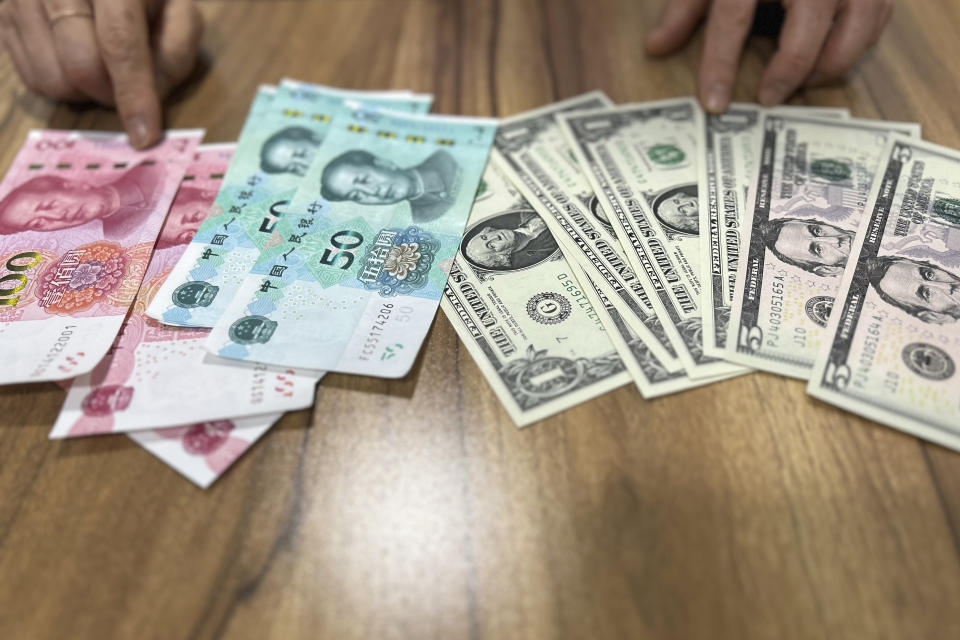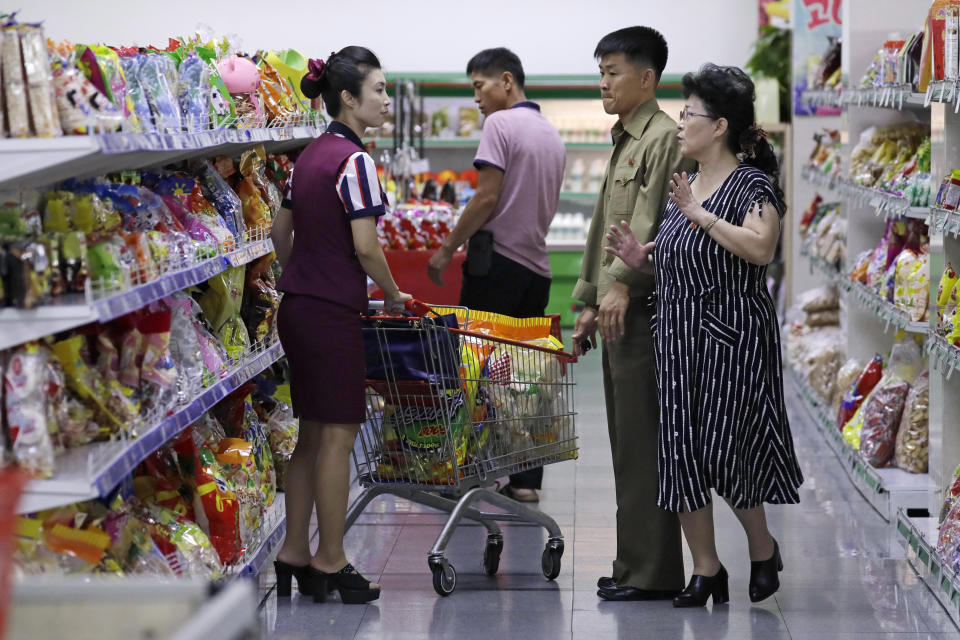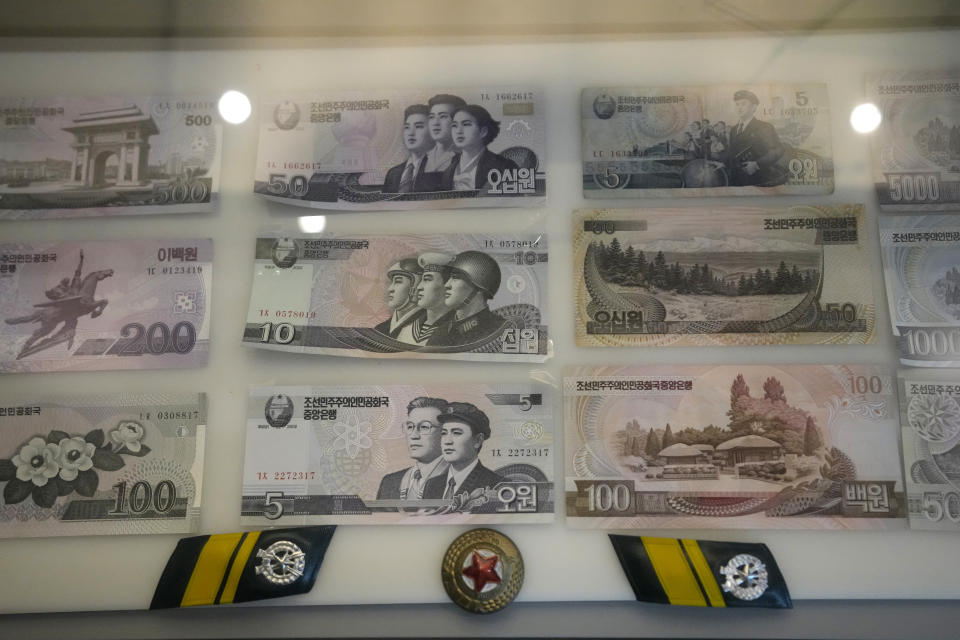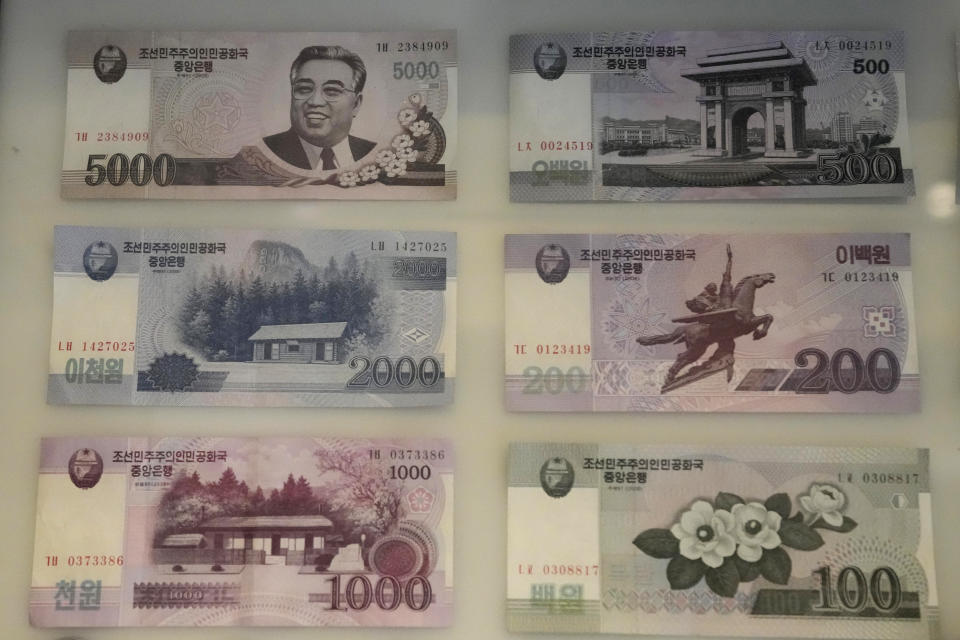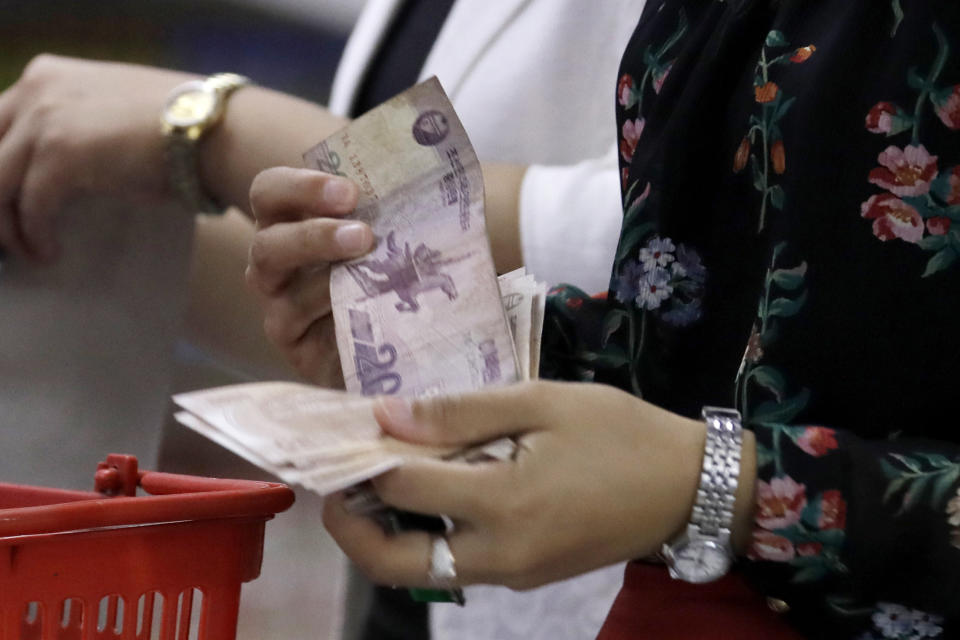SEOUL, South Korea (AP) — Before fleeing North Korea in 2014, Jeon Jae-hyun kept U.S. dollars as a store of value and used Chinese yuan to make everyday purchases at markets, restaurants and other places. He used the domestic currency, the won, only occasionally.
“There were not many places to use the won, and we actually had little faith in our currency,” Jeon said during a recent interview in Seoul. “Even the quality of North Korean bills was awful as they often ripped when we put them in our pockets.”
North Korea has tolerated the widespread use of more stable foreign currencies like U.S. dollars and Chinese yuan since a bungled revaluation of the won in 2009 triggered runaway inflation and public unrest.
The so-called “dollarization” helped ease inflation and stabilize exchange rates, enabling leader Kim Jong Un to establish a stable hold on power after he inherited that role in late 2011. But the trend poses a potential threat to Kim as it has undermined his government’s control over money supply and monetary policies.
The isolation of the pandemic badly hurt the North's economy but still gave Kim a chance to solidify social controls by restricting market activities and limiting influence from capitalist, democratic South Korea. Now, observers say Kim is trying to roll back use of the dollar and yuan to tighten his grip on power as the North grapples with pandemic-related hardships, longstanding U.N. sanctions and tensions with the U.S.
“He has no other choice but to strengthen the command economy as he’s been locked in confrontations with the U.S. while maintaining a border shutdown,” said Lim Eul-chul, a professor at Kyungnam University’s Institute for Far Eastern Studies in Seoul. “The current direction of the North’s economy is controlling markets in a stronger manner so there are still limits in demands for dollars.”
It’s unclear what Kim would do, since banning use of dollars and yuan could backfire by just confusing and angering the public, experts say. North Koreans are likely resisting attempts by authorities to take their foreign currency given the low level of public trust in the government’s economic policies, said Choi Ji-young, an analyst at Seoul’s state-funded Korea Institute for National Unification.
The shift to using dollars and yuan came amid economic turmoil and a famine in the 1990s that crumbled the state rationing system, prompting the emergence of capitalist-style markets.
The 2009 revaluation of the won led to even wider use of foreign currencies. To try to reassert control over nascent markets, authorities limited the amount of old bills that citizens could exchange with new North Korean won, wiping out much of their household savings. Realizing the local currency was unreliable, many began storing their savings in dollars and yuan.
Jeon, a former official from the northern North Korean city of Hyesan, had two boxes of North Korean won notes totaling 2 million won at his house in 2009, about what it would cost then to buy 60-80 smuggled, second-hand Japanese TVs. Most of that money became worthless since the authorities only allowed residents to exchange up to 200,000 won (about $60-70 at the time) per household in old bills for new money.
“My money was all gone. I was extremely frustrated and embarrassed but couldn’t do anything in protest,” Jeon said. “I saw many people crying and heard others fled to South Korea.”
The yuan has since become the most-used and preferred currency for savings in areas near the North’s border with China. The dollar has emerged as the most saved currency and the second most-used currency after the won in southern regions, according to surveys of defectors.
Jeon said he used the yuan to buy clothes, rice and other daily necessities, eat out or pay bribes to bosses. Most of his savings were stored in yuan and dollar bills. He kept a small amount of North Korean won for occasions like donating money to village campaigns to support military units.
Paek H.O, who defected from the northeastern North Korean town of Musan in 2018, said she used the yuan to buy expensive goods and the won for cheap items such as sodas, vegetables and bread sold at markets. About 50 professional money changers operated in Musan, she said.
“Using foreign currency is officially illegal but few ran into troubles or got arrested for using it,” said Paek, 47. She asked that her first name be identified using initials, citing worries for the safety of relatives in North Korea.
There are two exchange rates for the won -– an artificially high one set by the government and another set by the market that experts say more clearly reflects actual economic conditions in the country.
The won had stabilized at around 8,000 per dollar since 2012-2013 but suddenly sharply strengthened in 2020 when North Korea sealed its borders to guard against COVID-19. According to North Korea monitoring groups, the won was trading on the street at about 6,700-7,000 per dollar in late 2020; 4,600-7,200 in 2021; and 5,200-7,500 in the first half of 2022. Later in 2022 it dropped back to about 8,000 won per dollar.
The won’s value soared during the pandemic likely because demand for dollars and yuan fell due to the border closures and tighter controls on use of foreign currency. Such controls appear to have been enforced inconsistently though a lack of information from the secretive North makes it virtually impossible to get clear details.
Jeon said his relatives in Hyesan told him in phone calls that they weren’t allowed to use foreign currency in 2021 but could last year. Paek said her sisters in Musan told her last year that they were using the yuan.
Kang Mi-Jin, a defector who runs a company analyzing North Korea’s economy, said people in nearly 20 regions across North Korea voluntarily stopped using foreign currency in 2021 during a campaign against “anti-socialist elements" due to worries about possible punishment. Citing her contacts inside North Korea, Kang said the North Koreans also held onto foreign currency as a safe haven.
The return of exchange rates to pre-pandemic levels likely reflects revived demand for foreign currency amid speculation North Korea might soon lift its COVID-19 restrictions. But many experts say less foreign currency is in circulation and the government is likely intervening to control exchange rates in markets.
“Dollarization can’t be a long-term government policy as it’s like relinquishing sovereignty over monetary policy, though it’s still true that it helped the North’s economy stabilize and grow for the (earlier) years of Kim Jong Un’s rule,” said Lim Soo-ho, an analyst at the Institute for National Security Strategy, a think tank run by South Korea’s spy agency.
He said Kim’s government is likely “very carefully” examining whether to fully reopen the borders since an abrupt, full-fledged resumption of imports would push the value of the dollar against the won sharply higher, making imported goods more expensive.
Son Kwang Soo, an analyst at the Seoul-based KB Research in Seoul, said the North may be trying to keep the exchange rate in a narrow band of around 8,000 won per dollar.
Defectors say an attempt to end use of dollars and yuan would likely just cause chaos.
“Kim Jong Un will eventually leave ‘dollarization’ as it used to be. If he bans the use of foreign currency by ordinary citizens, the country’s monetary circulation would be disrupted,” Kang said. “My contacts in North Korea told me it's even hard to find some North Korean bills now.”

